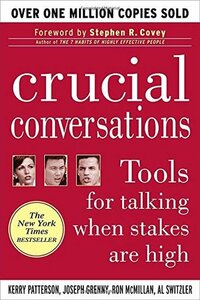Take a photo of a barcode or cover
708 reviews for:
Crucial Conversations: Tools for Talking When Stakes Are High
Ron McMillan, Kerry Patterson, Al Switzler, Joseph Grenny
708 reviews for:
Crucial Conversations: Tools for Talking When Stakes Are High
Ron McMillan, Kerry Patterson, Al Switzler, Joseph Grenny
I thought this book was one of the best I've read. I found it to be incredibly helpful in understanding conversation and how to have a productive conversation in an often tense situation. This is not a skill I am deft in and I often related to the tropes that lead to unproductive. The tips and ideas were easy to follow and I found myself making mental notes in what to do should I find myself in similar situations in the future. I have used them in a number of ways in everyday life and found they really do work well. I have a long way to go, but this book at least put me on the path to getting there!
I read this book for work (as a departmental book club). I really loved how actionable it was and I find myself mentally or on paper organizing my ideas to start crucial conversations using the tools they've provided. This is an area I've always struggled in, but now I feel like there is a way forward for me.
So I actually used just part of the advice in this book two nights ago during an argument that BF and I have allllllllll the time, and this time, sh*t got done. Super fantastic advice for how to improve ~soft social skills in this book.
I only gave it 4 stars because I think it could have been presented in a clearer, more accessible format. That being said, it was published 10 years ago, so it's still pretty fantastic, all things considered.
Bottom Line:
Read this if you want to improve your relationships with everyone—friends, family, bosses, colleagues, everyone.
I only gave it 4 stars because I think it could have been presented in a clearer, more accessible format. That being said, it was published 10 years ago, so it's still pretty fantastic, all things considered.
Bottom Line:
Read this if you want to improve your relationships with everyone—friends, family, bosses, colleagues, everyone.
Wanted to love it. Felt like it was written by someone who runs a pyramid scheme and could’ve been shortened by 3/4 if it wasn’t laden with filler. For me the whole book could have been summarized in saying; stop, breathe, listen, state your needs, be curious about the others’, collaborate, action. While I don’t think it was within the scope of practice of the authors, this book lacked in tools on how to physiologically return the body to safety in the midst of stressful conversations.
There were some good nuggets in here that I could apply to my life, both in work and at home.
I always have to get over the "business speak" when I listen/read a book like this. I own a copy (got it for free from a summit I attended) and the copy I own was expanded with more case studies -- but it also read more like a seminar to upsell you more "Crucial Conversations" literature/workshops/etc. which was off-putting.
I'm not a fan of books that tell you how to read them. I abandoned the Dale Carnegie classic because of that. This book ended with a "go back and re-listen to chapters you like and then implement them" which.....no. I get where you're going but I'm going to use this how I use it.
So, yeah, if you get a free copy, go ahead and give it a listen/read. Or if you're super into business books, it seems fairly standard. Maybe you'll glean some insights I missed by not "working the program."
I always have to get over the "business speak" when I listen/read a book like this. I own a copy (got it for free from a summit I attended) and the copy I own was expanded with more case studies -- but it also read more like a seminar to upsell you more "Crucial Conversations" literature/workshops/etc. which was off-putting.
I'm not a fan of books that tell you how to read them. I abandoned the Dale Carnegie classic because of that. This book ended with a "go back and re-listen to chapters you like and then implement them" which.....no. I get where you're going but I'm going to use this how I use it.
So, yeah, if you get a free copy, go ahead and give it a listen/read. Or if you're super into business books, it seems fairly standard. Maybe you'll glean some insights I missed by not "working the program."
informative
Crucial Conversations by Kerry Patterson, Joseph Grenny, Ron McMillan, Al Switzler and Emily Gregory
I found out about this book through my workplace. I mainly purchased it for work (I work in HR) and I wanted to explore learning how to navigate crucial conversations. It certainly did that and some more. Not only is this a great guide for the workplace (especially if you’re a manager/leader) but also for the personal relationships in your life. Learning to communicate efficiently and understanding the Other perspective is truly so important and this book guides us to find the truth.
I found out about this book through my workplace. I mainly purchased it for work (I work in HR) and I wanted to explore learning how to navigate crucial conversations. It certainly did that and some more. Not only is this a great guide for the workplace (especially if you’re a manager/leader) but also for the personal relationships in your life. Learning to communicate efficiently and understanding the Other perspective is truly so important and this book guides us to find the truth.
I took a Crucial Conversations class a few weeks back and while it was extremely helpful, I found the book to be a better tool for me. Maybe it was because I was simply reviewing the materials learned in class or it had just taken a little while to sink in, but either way, I liked how the book presented the skills needed to have a successful crucial conversation.
There are many effective tools to use, but I think the biggest thing is to recognize your own emotional signals and reactions to tough conversations. After you have some serious self realization, you can begin to change how you communicate, react, and have dialogue.
Many people may find this material obvious but many may have a reality check.
I'll definitely be using these skills in the future and take them with me into my work life and personal life.
There are many effective tools to use, but I think the biggest thing is to recognize your own emotional signals and reactions to tough conversations. After you have some serious self realization, you can begin to change how you communicate, react, and have dialogue.
Many people may find this material obvious but many may have a reality check.
I'll definitely be using these skills in the future and take them with me into my work life and personal life.
1 thing: get all the pertinent information out in the open
- Regardless of how people might feel about it
- Fear of speaking up leads to human error
- Bigger shared meaning in a pool greater investment better choices get made
Skills
- Start with heart
- Know what you want for you, everyone involved (goal), and don’t change motive with adrenaline
- Don’t make either or choices; think of a 3rd option that accomplishes the goal and clarify what you don’t want (the fear driving you to bad tactics)
- Dialogue is always an option
- High-risk conversations should solve problems and build relationships
Dual process
- Look at what and why
- Both sides of the conversation
- What people are saying and how they are reacting
- Takes knowledge and practice to know what to look for
- Signs people don’t feel safe: silence or violence / fear based
If you're able to take feedback:
- You respect that person's opinion
- You believe they have your best in mind
- You felt safe because you trusted the motives and ability of the other person
- Otherwise, you can’t accept feedback — even we’ll intended comments are suspicious
Silence and violence
- Any act to avoid adding to the pool of meaning
- Masking
- Avoiding
- Withdrawal
- Any act to control or compel others
- Try Force meaning into pool
- Coercing
- Labelling
- Attacking
- Low self-monitors
How to make it safe
Mutual purpose: care about goals interests and values, common outcome from the conversation
Lack:
- Debate
- Defensive
- Circling back
- Stay in dialogue when we honour people's humanity
- Apologize where appropriate
- Not an apology if you’re trying to win
- Have to sacrifice ego
- Skills for mutual purpose: CRIB
- Commit to seek mutual purpose
- Have to agree to agree
- Recognize the purpose behind the strategy
- What you ask for is a strategy to get what you want; think of another way to ask or find out why they want something
- Invent a mutual purpose
- Move to more encompassing goals
- Higher and longer term goes
- Transcend short term compromises
- Brainstorm new strategies
- Find something that meets everyone’s needs
- Step out of the content of the conflict
- When something happens to us we add meaning
- We create a story, motive and then make a judgment of that
- Then the body responds
- Our interpretation of the facts
- Our stories drive our emotions
- Storytelling happens blindly fast
- Feels like emotions first thoughts second
- Stories control us
- Change the stories we tell ourselves
- Expand emotional vocabulary
- Is it the right feeling?
- Challenge yourself
- Are there other valid options
- Don’t confuse stories with facts
- Test ideas
- Can you see or hear the thing you call fact
- Scowl and sarcasm are loaded accusations and sign were building stories
- We turn to silence or violence
- Then reason them away with our stories
- Dehumanize others to make it easier to act badly
Common stories
- Looking back
- Victim stories
- Villain stories
- Looking forward
- Helpless stories (sucker choices, unable to change our circumstances)
- All parties are responsible
Learn to tell a useful story
- Finish the story
- Clever stories omit: crucial info about us, others, our options
- Victims -> actors
- Am I pretending not to notice my role in the problem
- Villains -> human
- Why would a rational and decent person do what this person is doing
- Helpless -> able
- What do I really want for me, others, relationship
- What would I do now to get these results
- Don’t pick the sucker's choice
- State my path
- Speak persuasively not abrasively
- Start with facts
- Tell your story
- Ask for others' views
- Talk tentatively: tell as story, not fact
- Encourage testing: you want to hear controversial views
- Hold your belief, soften your approach
- When others clam up or blow up
- Can you get them to dialogue?
- It depends
- You have to restore safety to get there
- Be sincere, invite people to share what is on their minds
- Be patient, they could be feeling adrenaline, they need to settle down — strong emotions take time to subside
- Assign tasks and deadlines
- Without the specifics, it’ll fall through the cracks
- Asking questions, apologies, smiles, touch (not at work) can build safety





